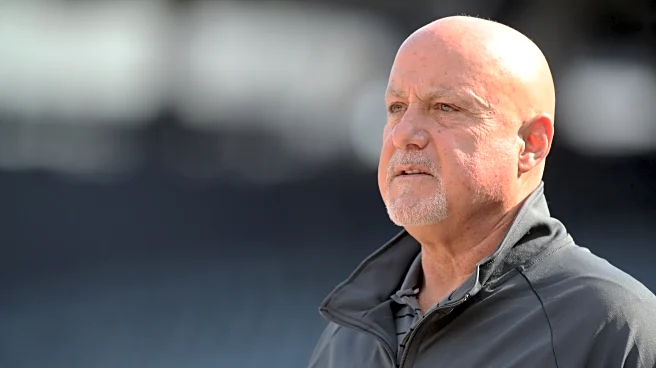It was no secret to Nationals fans that the ball club was running a very old-school ship the last few years. While many organizations in the league were developing and using all kinds of strategies like openers and torpedo bats to gain an advantage, the Nats seemed to be content keeping things the way they had been before, lacking change in a league that was defined by change. We didn’t know the full extent of this resistance to change, however, until an article published by Spencer Nusbaum in the Washington
Post yesterday revealed what was going on behind the scenes in 2025.
According to the article, there was a belief within the organization that they had begun to make strides in player development to catch up to the rest of baseball. In 2025, however, they felt as if they had taken a step back. How could that be? As it turns out, Mike Rizzo had had enough of some of the changes that were being made on the player development side of the team, and started making sweeping mandates that better fit “his vision”.
For instance, in 2024, the Nationals catchers were told to catch in the stance most comfortable to them, whether that be the traditional crouch or the modern one-knee-down approach. For whatever reason, in 2025, Mike Rizzo had had enough of the one-knee-down catching stance and made it a mandate within the organization for catchers to use the traditional stance.
It’s unbelievable that in 2025, with all the information and data we have out there, specifically in this case on catching stances, with one-knee-down having many benefits such as framing and just overall stamina improvement for catchers, that a team would choose to limit themselves in such a way. This mandate was removed once Mike DeBartolo took over as the interim GM after Rizzo’s firing, but half a season’s worth of opportunities to learn and improve for the Nats’ young catchers had been wiped by then.
Another ruling by Mike Rizzo to combat the rise of analytics in the Nats organization was the removal of performance analysts from the dugouts of the Nationals’ minor league affiliates. For years, the Nats had staffers for each minor league affiliate whose job was to translate information to the players and coaches so they could use it. For reasons unknown, before the 2025 season, Mike Rizzo told these staffers not to be in the dugout during games, perhaps somehow believing filling these players’ heads with numbers and info would make them worse at baseball. This decision was also reversed by Mike DeBartolo once he began running the show in July, but once again was half a season where players were losing potential advice and teaching moments.
A comment made by Seaver King, Nationals 2024 first-round pick, from the Arizona Fall League truly summarizes how backwards the Nationals’ player development has been with Mike Rizzo at the helm. After going 3-5 and finishing a triple shy of the cycle in a game in the AFL, King told MLB.com that he had spent all year trying to figure out his swing and hoping everything else would fall into place.
What has helped him change his approach was not coaching advice, but rather the advice of Detroit Tigers shortstop Kevin McGonigle, one of the top prospects in all of baseball and currently in the AFL, who told King, “It’s never about the swing. It’s always pitches and timing and all those things”. It took a 20-year-old prospect from another organization offering insight to King for him to begin to turn a corner, not anything coaches in the Nats organization were offering him. The lack of focus on plate approach also makes it clear why players such as CJ Abrams, Luis Garcia Jr, and Keibert Ruiz have seemingly no plan at the plate at times in the big leagues.
Based on what we knew beforehand and what this article told us, I believe Mike Rizzo knew his seat was hot entering 2025 and decided if he was going to go out, he was going to go out “his way”, and that meant sticking to his very traditionalist mindset. Between falling back on old free agent signings in Josh Bell and Trevor Williams in the offseason, mandating the traditional catcher’s stance throughout the organization, and kicking the performance analysts out of the minor league dugouts, Rizzo was all out on analytics in a league where the best ball clubs are all in on them. With all the information we have now and will certainly get in the future on Mike Rizzo’s stances on player development, it’s no surprise the failure the Nationals have had when it comes to developing young talent, especially on the hitting side of things.















